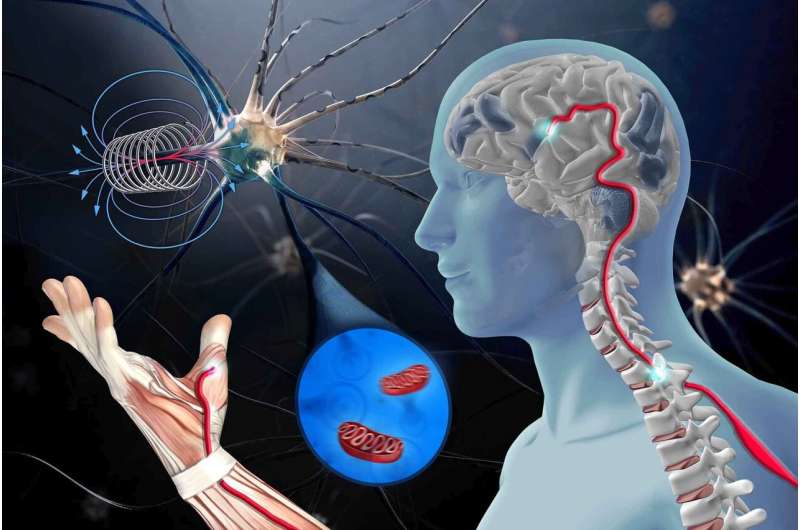This article has been reviewed according to Science X's editorial process and policies. Editors have highlighted the following attributes while ensuring the content's credibility:
fact-checked
trusted source
proofread
Reactivating damaged motor neurons using magnetic fields

Motor neurons in healthy individuals send signals to the skeletal muscles. ALS, however, is currently an incurable, neurodegenerative disease in which motor neurons are severely damaged and can therefore no longer transmit these signals. An interdisciplinary team at HZDR has proven in cell experiments that magnetic fields can restore impaired motor neurons. This could serve as the groundwork for an entirely new therapeutic approach in curing neurodegenerative diseases, as currently reported in the journal Cells.
Amyotrophic lateral sclerosis (ALS) is an incurable motor neuron disease, which generally leads to death within two to five years. No successful therapy has yet been developed.
Thomas Herrmannsdörfer, Helmholtz-Zentrum Dresden-Rosendorf (HZDR), department head at HZDR's Dresden High Magnetic Field Laboratory (HLD), works closely with physician Prof. Richard Funk. Together with colleagues from the Universities of Dresden and Rostock, they have assembled a research team stemming from the fields of physics, medicine, biology and biotechnology to investigate the therapeutic effect of magnetic fields on impaired motor neurons. In addition to the HLD, the HZDR's Center for Radiopharmaceutical Cancer Research (ZRT) was also involved in the project.
Promising in vitro trials
The cell biologists first reprogrammed skin cells from both healthy individuals as well as from ALS patients into motor neurons. Motor neurons possess projections (axons) measuring up to one meter long, which are used to transport substances and to transmit information. Researchers led by Dr. Arun Pal (HZDR) subsequently exposed motor neurons programmed in this way to magnetic fields of different strengths for different periods of time in petri dishes. Additional magnetic field parameters such as frequency, orientation and waveform were also varied.
"In the numerous series of experiments, we were able to demonstrate that the motor neurons from ALS patients respond to the magnetic fields," Pal says. "The axonal transport of mitochondria (the power stations of the cell) and other organelles that are impaired in ALS cells is reactivated by stimulation with magnetic fields. Furthermore, the axonal regeneration—which is the ability to regrow and reconnect—can be restored." The team used live cell imaging and cell biological methods for their study. At the same time, the team could also demonstrate that healthy cells were not damaged by this stimulation.
Although the results are a milestone for Herrmannsdörfer and his team, he nevertheless puts them into perspective. "We regard these in vitro results as an encouraging approach on the path to a potential novel therapy for ALS as well as other neurogenerative diseases. We also know, however, that detailed follow-up studies are required to corroborate our findings."
Transition to in vivo studies
Scientists are subsequently planning long-term and in vivo studies to further expand the therapeutic potential of magnetic field treatments. These studies include investigating the optimal technical parameters of the applied magnetic field. In addition, they aim to deepen the understanding of the cellular response to the various magnetic stimuli and therefore better comprehend the underlying mechanisms.
They will also study how cellular changes in other neurodegenerative disorders such as Parkinson's, Huntington's and Alzheimer's diseases react to magnetic field stimulation. In the long-term, the scientists are planning clinical pilot studies using specialized equipment for magnetic simulation.
More information: Wonphorn Kandhavivorn et al, Restoring Axonal Organelle Motility and Regeneration in Cultured FUS-ALS Motoneurons through Magnetic Field Stimulation Suggests an Alternative Therapeutic Approach, Cells (2023). DOI: 10.3390/cells12111502


















